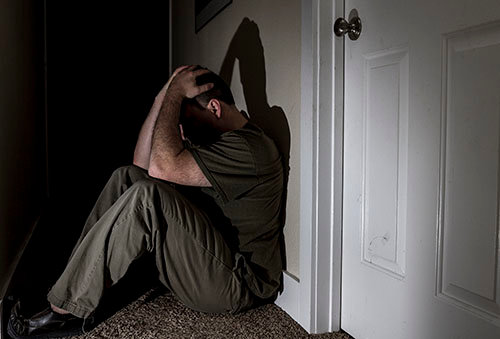 Isolation found in ministry can lead to depression and suicide, say psychologists after a CDC study that saw one of the largest suicide rate increases from 1999-2014 in males aged 45-64. THINKSTOCKPHOTOS.COM/Special
Isolation found in ministry can lead to depression and suicide, say psychologists after a CDC study that saw one of the largest suicide rate increases from 1999-2014 in males aged 45-64. THINKSTOCKPHOTOS.COM/SpecialFrom 1999-2014 the suicide rate in the United States increased by 24%, said the Center for Disease Control in a recently-released report, a signal to ministry leaders and volunteers how crucial prudence is in identifying and reporting depression and suicidal tendencies among congregants in their churches.
“As soon as a minister gets to a church, he or she needs to identify the nearest counseling center and become familiar with them,” stresses Dr. Will Bacon, licensed marriage and family therapist and president/CEO of the Georgia Baptist Health Care Ministry Foundation. “Don’t waste time when a situation presents itself. You need to be aware of your resources immediately.”
Males continue to have the highest suicide rate, and while those 75 years of age and older still place most at risk, that group’s rate was the only one to decline from 1999 (42.4 deaths per 100,000) to 2014 (38.8 per 100,000). Men aged 45-64 had the second-largest suicide rate and largest percent increase (43%).
The 45-64 age group for women held the highest suicide rate among females, but the biggest percentage increase (200%) overall came for girls aged 10-14, from .5 per 100,000 in 1999 to 1.5 in 2014.
The summary denotes a dividing line in the years cited for a jump in the suicide rate from 1% to 2%. Though the rate rose steadily from 1999-2014, the average annual percent increase was greater for the years 2006 and forward.
When confronted with an individual considering suicide, time is of the essence, says Dr. Jack Rainer.
“Get them to a professional for assessment ASAP,” Rainer, a board-certified psychologist at The Care and Counseling Center of Georgia in Decatur, emphasizes. “For kids and adults, it’s not unusual to think what it would be like to no longer be in this world. It’s a very different place if you have active plans and the intent to kill yourself.”
Both Bacon and Rainer cautioned ministry leaders in overestimating their own counseling skills and relationship with an individual or family when it came to assessing the potential for suicide. Student leaders, for example, may have an inaccurate read on a situation.
“They may assume they have the knowledge to talk someone out of it, more influence on him or her than in actuality, or that the individual isn’t serious about it,” says Bacon. “It’s an overstepping of professional competency that can occur from taking a few counseling classes and/or having a close relationship with an individual or family. Don’t misinterpret how easily and quickly a suicide can happen.”
Liability plays into the equation, adds Bacon. For a youth minister there can be tendency to alert the pastor first, something Bacon advises against. “This isn't a time for organizational hierarchy. If a student is quickly seeing a professional counselor or therapist, then the student minister has done what they’re supposed to do.”
Rainer echoed those thoughts.
“Regretfully, I’ve known folks who overestimated their ability to diagnose and assess, much less treat those students,” he testifies. “The last thing you want is a completed suicide you have to live with for the rest of your life.
“We live in a very difficult world now. It’s more complex and challenging than ever. With those challenges and complexities more people are feeling depressed, stressed, anxious, helpless, and at odds with themselves and the world. Suicide becomes more of an option and as it does it becomes more of a social issue.”
When news happens of a pastor taking his own life, online chatter and social media shares can skew the perspective on the prevalence of suicide among clergy. Nevertheless, the fact that males age 46-64 had a high increase in the suicide rate coupled with churches – and thereby pastors – facing financial as well as cultural challenges brings concern. The stigma of seeking help for depression and mental health as well as the nature of isolation found in ministry creates a dangerous environment.
“Pastors are a lot less likely to reach out for help due to pride and being in a leadership position,” says Dr. Tom Freeman, licensed psychologist with Lighthouse Counseling Center in Newnan. “Either they don’t want to admit they have a problem or they’re too embarrassed and feel they should have their act together.”
Though the two groups with the highest rates may seem to have little in common, Freeman cited one trait among young girls and middle-aged men that has added stress to the equation. Whether it’s physical appearance or worry over attendance numbers, the Internet has made it easier than ever to compare yourself to others.
“Social media and media in general have a lot to do with building anxiety and individuals seeing a picture of what they should be. As things get more stressful, they can also look online for destructive ways to deal with that stress."
For pastors looking to pray their way through it? “I would remind them that God works through professionals. He gave us the skills for a reason,” Freeman points out.
Rainer advises pastors against the tendency to keep things to yourself.
“Fatalistic feelings are amplified when you don’t talk about them,” he says. “Having a safe relationship with a therapist to disclose and talk about things puts you back in charge and makes you feel more capable. People think it’s easier to ‘tough out’ a time of depression, but a thoughtful evaluation by a professional to consider a bit of medication and time of therapy can make a life-changing difference.
“You can tough it out, but you don’t have to. There’s just too much good help available.”